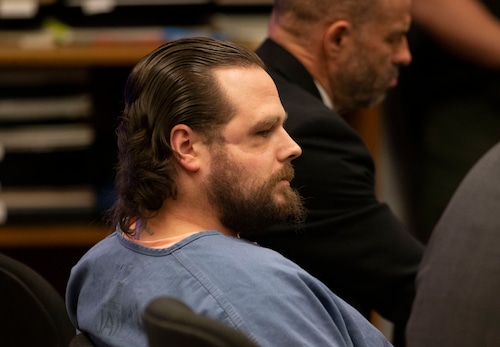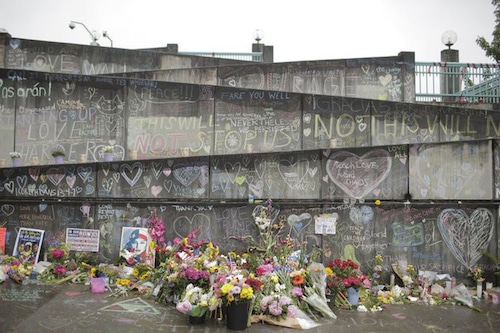A jury Friday found Jeremy Christian guilty of murdering two men and trying to murder a third man during a racist rant on a rush-hour MAX train in a unanimous verdict hailed by victims of the attack, their families and Portland leaders as a repudiation of hate.
The seven men and five women deliberated about 11 hours over two days before reaching their decision in the killings of Taliesin Namkai-Meche, 23, and Ricky Best, 53, and the serious wounding of Micah Fletcher, then 21, on May 26, 2017.
Christian stabbed all three in the neck on a Green Line train as it pulled into Northeast Portland’s Hollywood Transit Center on the eve of the Memorial Day weekend.
Jurors also found Christian guilty of hate crimes for threatening to harm two girls on the train, one an African American teenager and the other her friend, an immigrant from Somalia who was wearing a hijab. Witnesses said Christian unleashed a vile torrent about Muslims, Christians and Jews dying, spoke of beheadings and shouted, “Go home, we need American here!”
The judge read “guilty” 12 times -- one for every charge against Christian -- to a packed courtroom shortly before 3:30 p.m. Among those there to hear it were Fletcher, his father and relatives of Namkai-Meche and Best. Christian’s mother sat on the other side of the courtroom.
The other charges included assaulting an African American woman as part of a hate crime the night before on May 25, 2017. Demetria Hester testified Christian had repeatedly shouted “that he was a Nazi, that he hated all Muslims, blacks, Jews" while riding a Yellow Line train and she told him to stop. He threw a half-full Gatorade bottle at her, injuring her eye.
Christian also pointed his knife at commuter Shawn Forde after Christian stormed off the train. Christian fled and was arrested about a mile away, thanks in part to passengers who followed him and notified police of his location.
Christian expressed no emotion at the jury’s findings. Nine deputies were in the room to provide security.
Fletcher sat with his eyes closed. Tears streamed down Hester’s face. Some members of the dead men’s families cried quietly as they heeded the judge’s earlier warning to uphold courtroom decorum by refraining from audible reactions.

Jeremy Christian had no visible or audible reaction to the verdict. This photo was taken after the judge announced he was guilty on all counts on February 20, 2020. Beth Nakamura, The Oregonian/OregonLive/Pool
In the hallway afterward, Hester offered a friend a big hug and exclaimed “Black Lives Matter!” Moments later, she explained her relief to a crowd of reporters outside the courthouse.
“It (the verdict) let people like Jeremy Joseph Christian know that you’re not going to get away with it," Hester said. “We do have people that care about all of us because black lives do matter. And the people that were killed, they did that out of love and protection.”
She said white supremacy should never be tolerated.
“This gave us hope ... yes there’s actually people out there that don’t want this to happen and want it to stop," she said.
Fletcher quietly left the courthouse without making any comments. But his father, Michael Fletcher, expressed gratitude for the jurors. He said he felt “justice has been served.”
He said his son is doing well.
“He’s just trying to put his life back together and kind of move forward,” the elder Fletcher said.
The two teen girls targeted by Christian, Walia Mohamed and Destinee Mangum, weren’t in the courtroom, but Mangum’s mother, Dyjuana Hudson, passed on the news from the courthouse and said both were “very happy” with the jury’s decision. Mohamed had testified during the trial that she no longer wears a hijab out of fear for her safety in public.
“It’s been a long emotional ride ... very hard for them,” Hudson said. "They’re getting over it. They’re taking the steps necessary to heal properly. They’re doing better.”
Multnomah County District Attorney Rod Underhill sat in the back of the courtroom for the verdict and said afterward that he was pleased and that his office will “continue to focus our efforts toward helping” the victims and their families.
“Our community continues to feel the profound impact from this violent and racist attack that happened more than two years ago," he said in a statement. “This verdict supports and upholds the state’s belief that Jeremy Joseph Christian acted intentionally when he committed these crimes. We thank the jurors for their dedication, diligence and swift deliverance of justice.”
Portland Police Chief Jami Resch said the attack caused far-reaching trauma.
“While the criminal phase of this event has concluded, the deep impacts of the loss of lives for the families, friends, and our community will not be forgotten,” Resch said. “Violence is not acceptable in the city of Portland. My hope is for us to come together as a community with more kindness and increased tolerance for differences as we continue our healing.”
About 3 1/2 miles east of the courthouse Friday afternoon, a woman placed a bouquet of roses next to the memorial mural wall at the Hollywood station.
A sentencing date for Christian hasn’t been scheduled yet.
Jurors -- one who is black and the others who appear to be white -- were unanimous on all counts: two first-degree murder charges in the deaths of Namkai-Meche and Best; first-degree attempted murder and first-degree assault of Fletcher; second-degree intimidation against the teenage girls and Hester; unlawful use of a weapon and menacing against Forde; and second-degree assault, menacing and unlawful use of a weapon against Hester.
Jurors will return to the courtroom Tuesday and Wednesday to make findings about who Christian is as a person and his crimes. That will help the judge determine the sentence.
Under Oregon’s 2019 first-degree murder law, Multnomah County Circuit Judge Cheryl Albrecht has two options: She could sentence Christian to “true life” -- meaning he’ll spend the rest of his life in prison with no possibility of release -- or she could sentence him to life in prison with a 30-year minimum.
But in the case of the latter, the judge could order that Christian serve two consecutive 30-year minimum terms, for a total of at least 60 years. On top of that, she could add another 7 1/2 years for attempted murder and possibly several years more for the other charges.
If the judge sentences Christian to consecutive sentences, he could be more than 100 years old before he’s eligible for release. He was 35 at the time of the stabbings.
The verdict didn’t come as a surprise to many, given the overwhelming evidence against Christian.
The stabbings -- and the moments before and after -- were caught on transit surveillance video and videos recorded by passengers using their cellphones, offering jurors a view of precisely what unfolded on the train that day about 4:30 p.m. The existence of such footage is highly unusual in a murder case.
Christian also made many statements about wanting to stab people the night before. After his arrest, he said he was protecting his right to free speech and he hoped the people he stabbed died.
The videos show Christian yelling for at least six minutes before he pulled out a nearly 4-inch knife and used it.
Some passengers said they hadn’t thought at the time that Christian was directing his tirade at anyone in particular. Defense attorneys pointed out that during Christian’s harangue, video showed him looking directly at the two girls for only 31 seconds. But police Detective Michele Michaels said Christian at one point in the ride was looking at the teenagers when he “made a slicing motion across his neck” using his hand.
Both girls, who were 16 and 17 years old at the time, said they felt threatened by Christian. They said when the train stopped, they ran into a nearby health club and hid for fear that Christian would follow and hurt or kill them.
Christian’s crimes horrified commuters who witnessed the carnage. More than a dozen testified during the trial, which spanned 15 days of court over four weeks.
Many said at first they thought a fistfight had broken out on the train, then they saw blood pouring from the men. Some said they tried futilely to help Best, who was declared dead on the train, and Namkai-Meche, who died in an ambulance on the way to the hospital.
One man held a child’s jacket and a baby blanket to Micah Fletcher’s neck and helped him call his mother.
Within hours of the rampage, civil rights leaders across the country condemned the stabbings, and stunned local leaders and residents paid tribute to the men who died. Community members scrawled hundreds of chalk declarations of love and peace at the transit center and placed piles of flowers and other mementos there.

In the days after the stabbings, the public created a memorial of chalk messages at the Hollywood Transit Center in Northeast Portland, the site of the attacks. (Stephanie Yao Long/The Oregonian)
The attack brought back Portland’s history of racist violence.
In 1988, Mulugeta Seraw, a 28-year-old Ethiopian immigrant, was surrounded and bludgeoned to death with a baseball bat by three skinheads on a Southeast Portland street.
Last year, the first time since Seraw was killed, a Portland jury found another man guilty of a hate crime murder. Russell Orlando Courtier was sentenced to at least 28 years in prison for acting out of racial malice in running over African American teenager Larnell Bruce Jr. in 2016. Prosecutors presented evidence that Courtier was a member of a white supremacist prison gang and was wearing the gang’s logo on his baseball cap when he encountered Bruce outside a convenience store.
On Friday, a member of Portland’s Islamic community said he hoped the jury’s decision in the MAX stabbings would help inspire change.
“We welcome the verdict in this case and hope that it leads to a new path for Oregon -- one in which we all see the importance of standing up to and defeating hate,” said Zakir Khan, a spokesman for the Oregon chapter of the Council on American-Islamic Relations. “The memories of Ricky Best and Taliesin Myrddin Namkai-Meche’s lives should remind us of the courage that we all must use to develop a new culture here in Oregon. That culture should be one in which we accept, love and believe in each other.”
(Reporter Shane Dixon Kavanaugh of The Oregonian/OregonLive contributed to this story.)
-- Aimee Green
o_aimee
Keep up with key trial events and takeaways by signing up for The Oregonian/OregonLive’s Jeremy Christian trial newsletter at oregonlive.com/newsletters.
Visit subscription.oregonlive.com/newsletters to get Oregonian/OregonLive journalism delivered to your email inbox.

